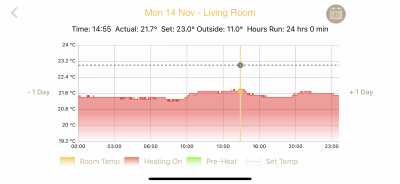Should we turn off ASHP for an hour to benefit from Octopus Saving Sessions?
We've signed up to Octopus Energy Saving Sessions and have opted in for the one tonight at 5pm to 6pm. If we reduce our electricity consumption in that hour, we could save up to £2.25. It isn't just about the savings for us, but ensuring there is more energy available for the general population too at peak times when energy is scarce.
Would it make any difference if we switched off our ASHP for an hour with the weather relatively mild to take advantage of this saving? Or would the reheating of the hot water, buffer tank, underfloor heating downstairs and rads upstairs negate any benefit from the saving?
There could be many of these over the winter, and when it is really cold, would it be more efficient just to keep the heating and hot water on and turn off lights, TVs, washing machines, induction cooker etc?
Currently, we keep the heating on permanently using weather compensation, and our hot water is heated from 6am to 8:30pm (plus 3:30am to 4:30am to give it a pre-heat when we have the cheap Octopus Go tariff) due to five people in our house and variable showering times and three teenage girls that also like to take a lot of baths.
Thanks
Hi Knukes, welcome to the forum.
Much depends on the rate of heat loss at your home and its thermal mass.
One thing that you could try is to raise the indoor temperature slowly by 1C or maybe 2C during the warmest part of the afternoon when your heat pump is operating at its most efficient. Then drop the setpoint back to its original setting and see if the heat pump stops running for more than the one hour, if necessary also turn your heat pump off for the designated period.
Even if you do not save much energy at home, it could do so elsewhere by reducing distribution system losses and also the needed to run less efficient generating plant.
Please post your results.
Thank you very much @derek-m for your kind welcome and response.
We don't currently have the internet service gateway for our ASHP due to Stiebel Eltron shortages, so I have to rely on the Heatmiser stats info. The house has very thick walls and a huge slab of UFH downstairs, so I'll give it a go this afternoon and see what happens. I've included yesterday's data for our living room, which seems pretty consistent to me with outside temperatures between 5 degrees and 10 degrees yesterday (that would be weather forecast data though).
Looking at the data, it would appear that the indoor temperature increases naturally during the afternoon due to solar gain, which is to be expected when operating on weather compensation.
I suppose the easiest way to shutdown your heat pump for the designated period, would be to turn down your Heatmiser thermostat to say 20C. Once the required shutdown period has been completed, reset the thermostat to 23C and see how your heat pump responds.
I’ll be turning mine down
yes it could cost a bit more the following hour (and ours is in room adapt so it’ll adjust flow temp upwards slightly)
but the layout is £2+ /kWh. So compared to 30p you could spend up to 6x more the following hours and still be in pocket. So I defo think it’s worthwhile.
250sqm house. 30kWh Sunsynk/Pylontech battery system. 14kWp solar. Ecodan 14kW. BMW iX.
This is what we're doing, yes. I'm also doing as @Derek-M suggested and raising the flow temperature during the day and using the thermal mass of the house as a heat battery for that hour period (we do this anyway, I'm just timing it differently).
One curious feature of the Octopus scheme is that, because it uses the average usage during the same time period over previous days/weeks as the baseline for calculating how much electricity you are not using, it is incentivising me to shift my usage into the 4pm-7pm peak hours on days where there are no saving sessions, so that I have a higher baseline to drop from. For example, if I'd normally put the hot water on at 3pm so that it's warm for the evening, I'd instead put it on at 4pm. This way my baseline for a future 4pm-5pm Saving Session will be higher, making it easier to "save electricity" by shifting the hot water back to 3pm. I'm on the Go tariff so it makes no difference cost wise. You're obviously doing it for positive societal reasons too, so perhaps this sounds like a terrible idea, but I'm sure I'm not the only one thinking it!
Ovo's scheme seemed like a better idea to me, where people are paid money based on what fraction of their usage falls within vs outside of the designated peak period. Basically targetting a usage pattern that they want people to follow and incentivising people to follow that pattern, even if it means rewarding people who would have followed that pattern anyway without incentives.
ASHP: Mitsubishi Ecodan 8.5kW
PV: 5.2kWp
Battery: 8.2kWh
I am not sure what to do as with the battery we don't really use anything anyway. Octopus said they'll work out any reduction, but they don't say what I usually use anyway. I'll sign up, but fully expect to get nothing back.
Posted by: @scrchngwslOne curious feature of the Octopus scheme is that, because it uses the average usage during the same time period over previous days/weeks as the baseline for calculating how much electricity you are not using, it is incentivising me to shift my usage into the 4pm-7pm peak hours on days where there are no saving sessions,
You say "curious", I say "stupid and unethical"!
It also doesn't reward longterm energy reducers, unless we also load shift into peak on non-saving days. I'm really disappointed in octopus over this.
- 27 Forums
- 2,495 Topics
- 57.8 K Posts
- 393 Online
- 6,220 Members
Join Us!
Worth Watching
Latest Posts
-
RE: Solis inverters S6-EH1P: pros and cons and battery options
@batpred I reckon Andy might know a thing or 2 about...
By Bash , 4 minutes ago
-
RE: What determines the SOC of a battery?
@batpred Ironically you didn't have anything good to...
By Bash , 1 hour ago
-
RE: Testing new controls/monitoring for Midea Clone ASHP
Here’s a current graph showing a bit more info. The set...
By benson , 1 hour ago
-
RE: Setback savings - fact or fiction?
True there is a variation but importantly it's understa...
By RobS , 1 hour ago
-

Below is a better quality image. Does that contain all ...
By trebor12345 , 2 hours ago
-
Sorry to bounce your thread. To put to bed some concern...
By L8Again , 2 hours ago
-

@painter26 — they (the analogue gauges) are subtly diff...
By cathodeRay , 2 hours ago
-

RE: Electricity price predictions
I am always impressed with how you keep abreast of so m...
By Batpred , 3 hours ago
-
RE: Humidity, or lack thereof... is my heat pump making rooms drier?
@majordennisbloodnok I’m glad I posted this. There see...
By AndrewJ , 3 hours ago
-
Our Experience installing a heat pump into a Grade 2 Listed stone house
First want to thank everybody who has contributed to th...
By Travellingwave , 6 hours ago
-
RE: Struggling to get CoP above 3 with 6 kw Ecodan ASHP
Welcome to the forums.I assume that you're getting the ...
By Sheriff Fatman , 9 hours ago
-
RE: Say hello and introduce yourself
@editor @kev1964-irl This discussion might be best had ...
By GC61 , 10 hours ago
-

RE: Oversized 10.5kW Grant Aerona Heat Pump on Microbore Pipes and Undersized Rads
@uknick TBH if I were taking the floor up ...
By JamesPa , 1 day ago
-

RE: Getting ready for export with a BESS
I would have not got it if it was that tight
By Batpred , 1 day ago
-
RE: Need help maximising COP of 3.5kW Valiant Aerotherm heat pump
@judith thanks Judith. Confirmation appreciated. The ...
By DavidB , 1 day ago
-

RE: Recommended home battery inverters + regulatory matters - help requested
That makes sense. I thought better to comment in this t...
By Batpred , 1 day ago
-
Bosch CS5800i 7kW replacing Greenstar Junior 28i
My heat pump journey began a couple of years ago when I...
By Slartibartfast , 1 day ago
-

RE: How to control DHW with Honeywell EvoHome on Trianco ActiveAir 5 kW ASHP
The last photo is defrost for sure (or cooling, but pre...
By JamesPa , 1 day ago
-

RE: Plug and play solar. Thoughts?
Essentially, this just needed legislation. In Germany t...
By Batpred , 1 day ago
-
RE: A Smarter Smart Controller from Homely?
@toodles Intentional opening of any warranty “can of wo...
By Papahuhu , 1 day ago
-
RE: Safety update; RCBOs supplying inverters or storage batteries
Thanks @transparent Thankyou for your advic...
By Bash , 1 day ago
-
RE: Air source heat pump roll call – what heat pump brand and model do you have?
Forum Handle: Odd_LionManufacturer: SamsungModel: Samsu...
By Odd_Lion , 1 day ago
-
RE: Configuring third party dongle for Ecodan local control
Well, it was mentioned before in the early pos...
By F1p , 2 days ago





